Teamwork Effectiveness: A Case Study in Health and Social Care
VerifiedAdded on 2020/11/12
|11
|2372
|26
Report
AI Summary
This research proposal investigates the significance and effectiveness of teamwork within the health and social care sector, with a specific focus on the National Health Service (NHS). The report begins with an overview, outlining the research aim, objectives, questions, and rationale, along with a proposed timescale. Chapter 2 provides a comprehensive literature review, exploring the core concepts of teamwork, its importance in health and social care, and potential avenues for improvement within the NHS context. Chapter 3 details the research methodology, including the type of research (qualitative), research design (descriptive), research approach (inductive), and research philosophy (interpretivism). It also covers data sampling (purposive sampling with 50 respondents), ethical considerations, and data presentation methods. The proposal emphasizes the importance of teamwork for enhancing patient care, reducing medical errors, and improving overall organizational performance. The report also identifies limitations such as potential conflicts and high costs and proposes solutions. The report concludes with a list of relevant references from books and journals. This report is a valuable resource, available on Desklib, for students seeking to understand the intricacies of teamwork in healthcare.
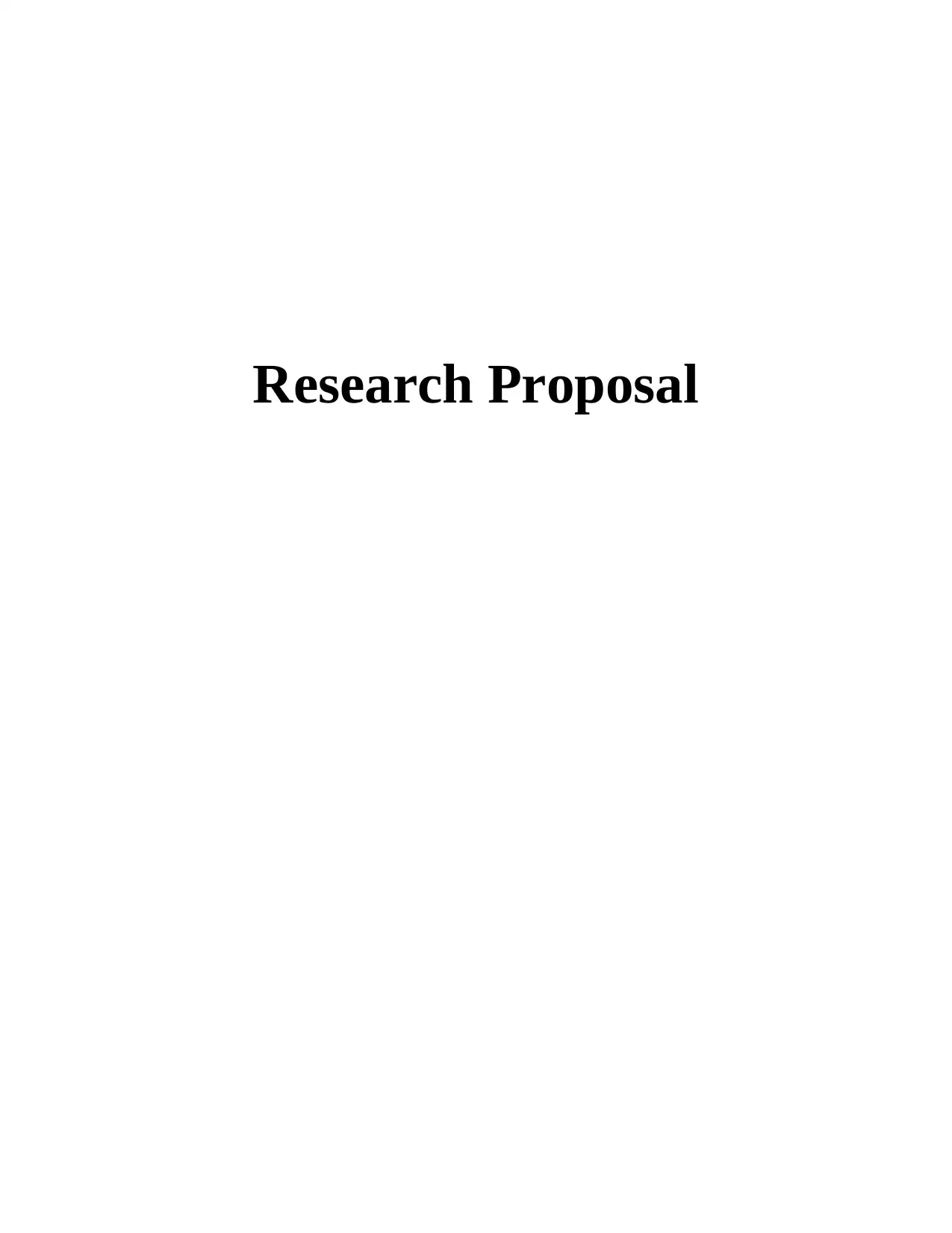
Research Proposal
Paraphrase This Document
Need a fresh take? Get an instant paraphrase of this document with our AI Paraphraser
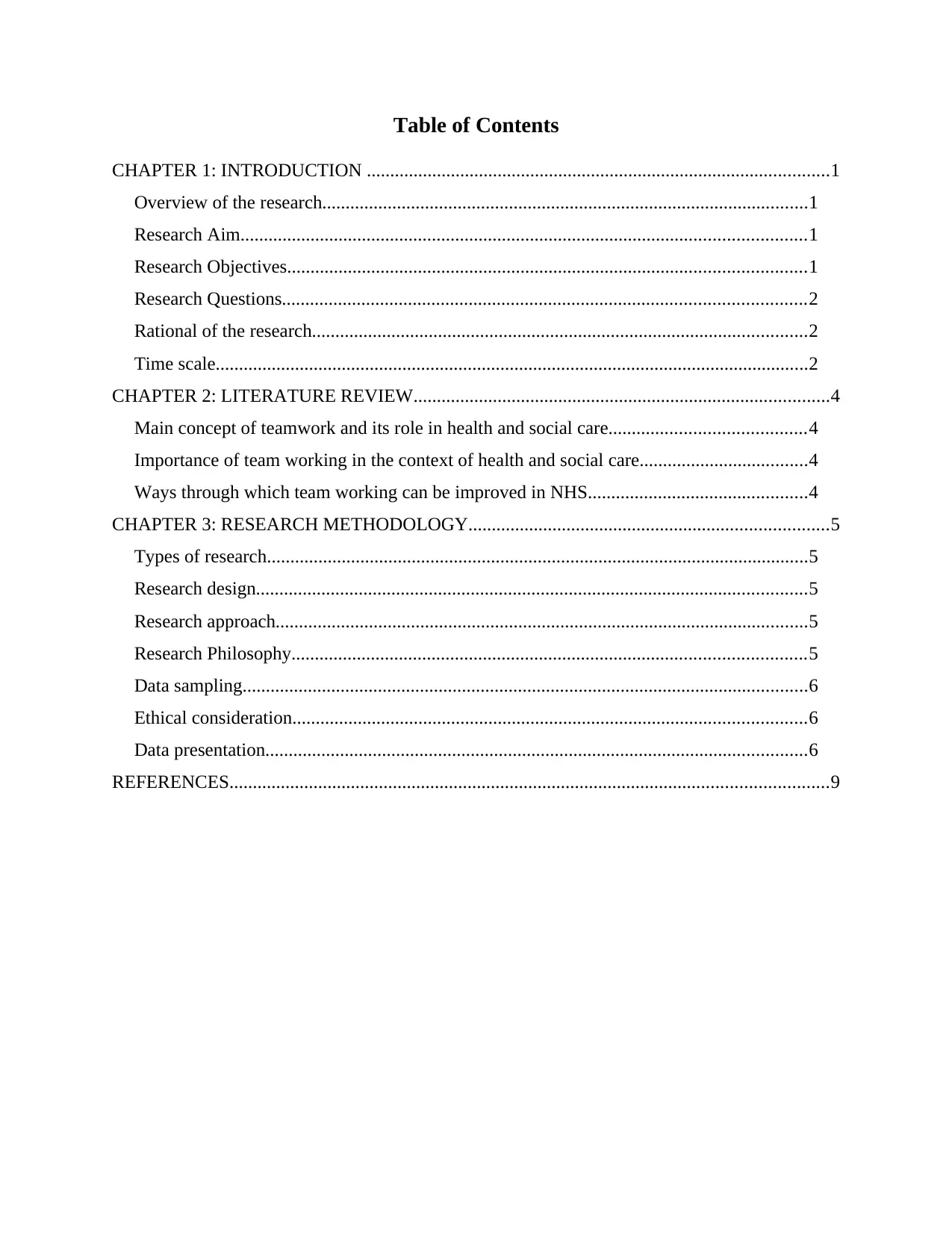
Table of Contents
CHAPTER 1: INTRODUCTION ...................................................................................................1
Overview of the research........................................................................................................1
Research Aim.........................................................................................................................1
Research Objectives...............................................................................................................1
Research Questions................................................................................................................2
Rational of the research..........................................................................................................2
Time scale...............................................................................................................................2
CHAPTER 2: LITERATURE REVIEW.........................................................................................4
Main concept of teamwork and its role in health and social care..........................................4
Importance of team working in the context of health and social care....................................4
Ways through which team working can be improved in NHS...............................................4
CHAPTER 3: RESEARCH METHODOLOGY.............................................................................5
Types of research....................................................................................................................5
Research design......................................................................................................................5
Research approach..................................................................................................................5
Research Philosophy..............................................................................................................5
Data sampling.........................................................................................................................6
Ethical consideration..............................................................................................................6
Data presentation....................................................................................................................6
REFERENCES................................................................................................................................9
CHAPTER 1: INTRODUCTION ...................................................................................................1
Overview of the research........................................................................................................1
Research Aim.........................................................................................................................1
Research Objectives...............................................................................................................1
Research Questions................................................................................................................2
Rational of the research..........................................................................................................2
Time scale...............................................................................................................................2
CHAPTER 2: LITERATURE REVIEW.........................................................................................4
Main concept of teamwork and its role in health and social care..........................................4
Importance of team working in the context of health and social care....................................4
Ways through which team working can be improved in NHS...............................................4
CHAPTER 3: RESEARCH METHODOLOGY.............................................................................5
Types of research....................................................................................................................5
Research design......................................................................................................................5
Research approach..................................................................................................................5
Research Philosophy..............................................................................................................5
Data sampling.........................................................................................................................6
Ethical consideration..............................................................................................................6
Data presentation....................................................................................................................6
REFERENCES................................................................................................................................9

⊘ This is a preview!⊘
Do you want full access?
Subscribe today to unlock all pages.

Trusted by 1+ million students worldwide
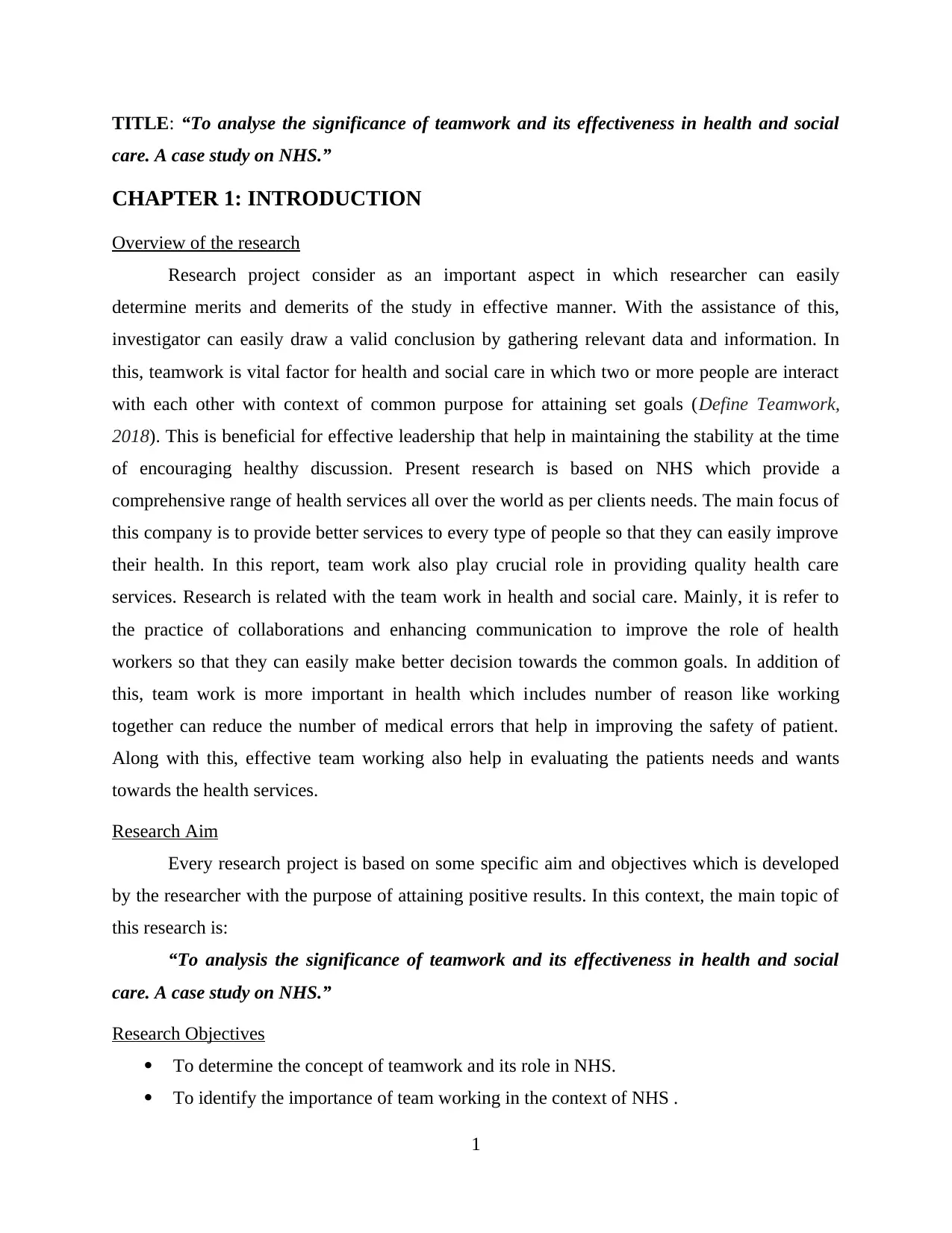
TITLE: “To analyse the significance of teamwork and its effectiveness in health and social
care. A case study on NHS.”
CHAPTER 1: INTRODUCTION
Overview of the research
Research project consider as an important aspect in which researcher can easily
determine merits and demerits of the study in effective manner. With the assistance of this,
investigator can easily draw a valid conclusion by gathering relevant data and information. In
this, teamwork is vital factor for health and social care in which two or more people are interact
with each other with context of common purpose for attaining set goals (Define Teamwork,
2018). This is beneficial for effective leadership that help in maintaining the stability at the time
of encouraging healthy discussion. Present research is based on NHS which provide a
comprehensive range of health services all over the world as per clients needs. The main focus of
this company is to provide better services to every type of people so that they can easily improve
their health. In this report, team work also play crucial role in providing quality health care
services. Research is related with the team work in health and social care. Mainly, it is refer to
the practice of collaborations and enhancing communication to improve the role of health
workers so that they can easily make better decision towards the common goals. In addition of
this, team work is more important in health which includes number of reason like working
together can reduce the number of medical errors that help in improving the safety of patient.
Along with this, effective team working also help in evaluating the patients needs and wants
towards the health services.
Research Aim
Every research project is based on some specific aim and objectives which is developed
by the researcher with the purpose of attaining positive results. In this context, the main topic of
this research is:
“To analysis the significance of teamwork and its effectiveness in health and social
care. A case study on NHS.”
Research Objectives
To determine the concept of teamwork and its role in NHS.
To identify the importance of team working in the context of NHS .
1
care. A case study on NHS.”
CHAPTER 1: INTRODUCTION
Overview of the research
Research project consider as an important aspect in which researcher can easily
determine merits and demerits of the study in effective manner. With the assistance of this,
investigator can easily draw a valid conclusion by gathering relevant data and information. In
this, teamwork is vital factor for health and social care in which two or more people are interact
with each other with context of common purpose for attaining set goals (Define Teamwork,
2018). This is beneficial for effective leadership that help in maintaining the stability at the time
of encouraging healthy discussion. Present research is based on NHS which provide a
comprehensive range of health services all over the world as per clients needs. The main focus of
this company is to provide better services to every type of people so that they can easily improve
their health. In this report, team work also play crucial role in providing quality health care
services. Research is related with the team work in health and social care. Mainly, it is refer to
the practice of collaborations and enhancing communication to improve the role of health
workers so that they can easily make better decision towards the common goals. In addition of
this, team work is more important in health which includes number of reason like working
together can reduce the number of medical errors that help in improving the safety of patient.
Along with this, effective team working also help in evaluating the patients needs and wants
towards the health services.
Research Aim
Every research project is based on some specific aim and objectives which is developed
by the researcher with the purpose of attaining positive results. In this context, the main topic of
this research is:
“To analysis the significance of teamwork and its effectiveness in health and social
care. A case study on NHS.”
Research Objectives
To determine the concept of teamwork and its role in NHS.
To identify the importance of team working in the context of NHS .
1
Paraphrase This Document
Need a fresh take? Get an instant paraphrase of this document with our AI Paraphraser
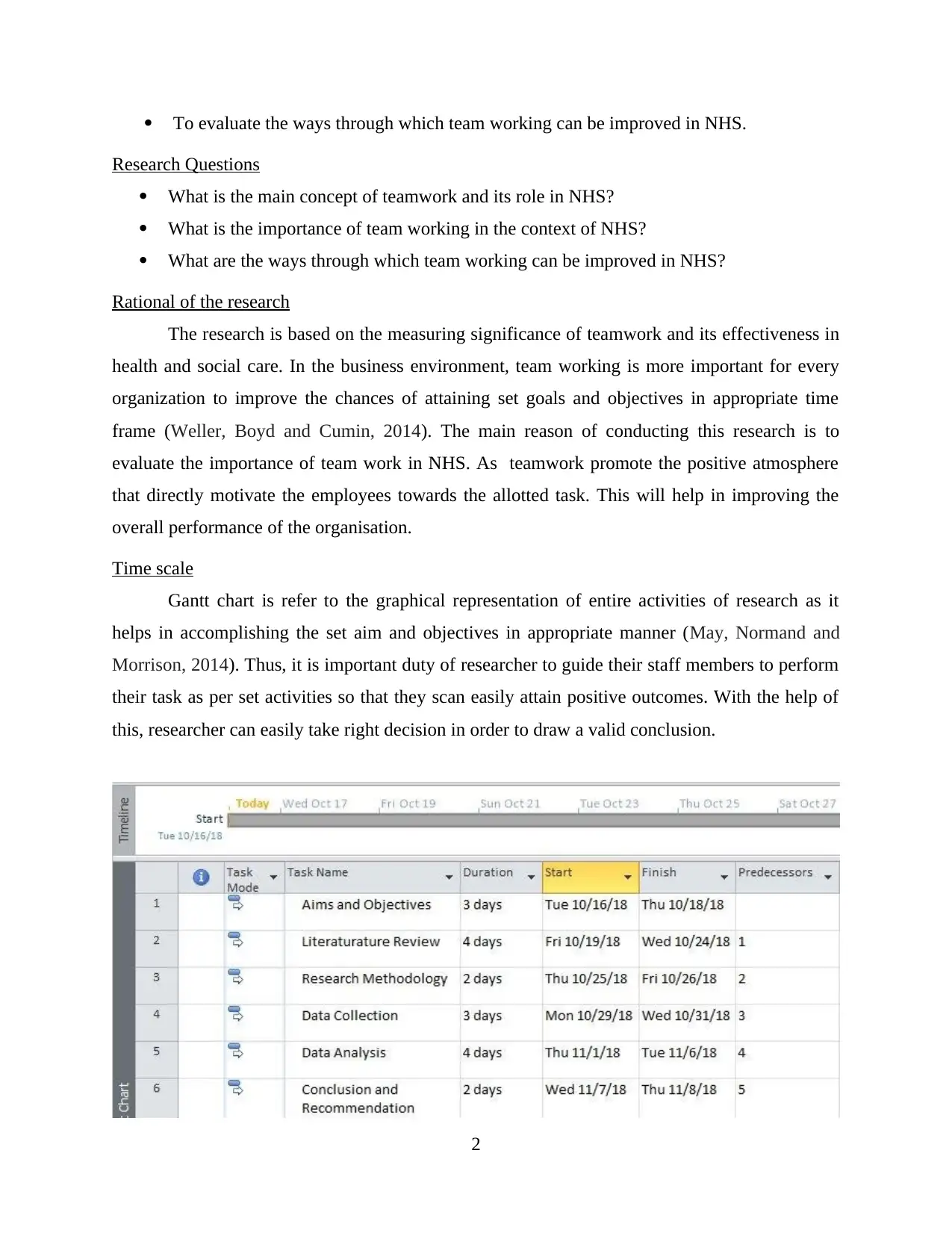
To evaluate the ways through which team working can be improved in NHS.
Research Questions
What is the main concept of teamwork and its role in NHS?
What is the importance of team working in the context of NHS?
What are the ways through which team working can be improved in NHS?
Rational of the research
The research is based on the measuring significance of teamwork and its effectiveness in
health and social care. In the business environment, team working is more important for every
organization to improve the chances of attaining set goals and objectives in appropriate time
frame (Weller, Boyd and Cumin, 2014). The main reason of conducting this research is to
evaluate the importance of team work in NHS. As teamwork promote the positive atmosphere
that directly motivate the employees towards the allotted task. This will help in improving the
overall performance of the organisation.
Time scale
Gantt chart is refer to the graphical representation of entire activities of research as it
helps in accomplishing the set aim and objectives in appropriate manner (May, Normand and
Morrison, 2014). Thus, it is important duty of researcher to guide their staff members to perform
their task as per set activities so that they scan easily attain positive outcomes. With the help of
this, researcher can easily take right decision in order to draw a valid conclusion.
2
Research Questions
What is the main concept of teamwork and its role in NHS?
What is the importance of team working in the context of NHS?
What are the ways through which team working can be improved in NHS?
Rational of the research
The research is based on the measuring significance of teamwork and its effectiveness in
health and social care. In the business environment, team working is more important for every
organization to improve the chances of attaining set goals and objectives in appropriate time
frame (Weller, Boyd and Cumin, 2014). The main reason of conducting this research is to
evaluate the importance of team work in NHS. As teamwork promote the positive atmosphere
that directly motivate the employees towards the allotted task. This will help in improving the
overall performance of the organisation.
Time scale
Gantt chart is refer to the graphical representation of entire activities of research as it
helps in accomplishing the set aim and objectives in appropriate manner (May, Normand and
Morrison, 2014). Thus, it is important duty of researcher to guide their staff members to perform
their task as per set activities so that they scan easily attain positive outcomes. With the help of
this, researcher can easily take right decision in order to draw a valid conclusion.
2
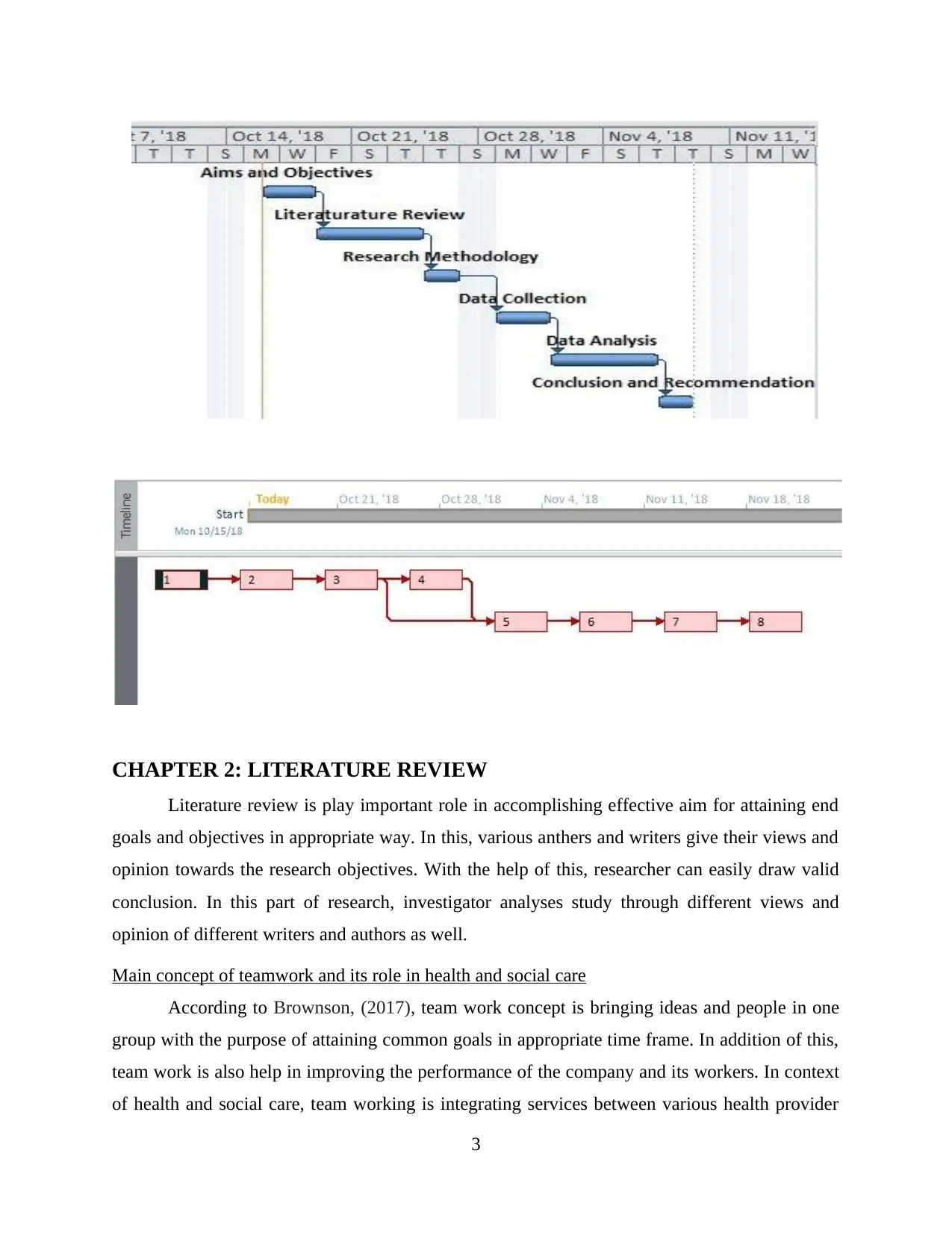
CHAPTER 2: LITERATURE REVIEW
Literature review is play important role in accomplishing effective aim for attaining end
goals and objectives in appropriate way. In this, various anthers and writers give their views and
opinion towards the research objectives. With the help of this, researcher can easily draw valid
conclusion. In this part of research, investigator analyses study through different views and
opinion of different writers and authors as well.
Main concept of teamwork and its role in health and social care
According to Brownson, (2017), team work concept is bringing ideas and people in one
group with the purpose of attaining common goals in appropriate time frame. In addition of this,
team work is also help in improving the performance of the company and its workers. In context
of health and social care, team working is integrating services between various health provider
3
Literature review is play important role in accomplishing effective aim for attaining end
goals and objectives in appropriate way. In this, various anthers and writers give their views and
opinion towards the research objectives. With the help of this, researcher can easily draw valid
conclusion. In this part of research, investigator analyses study through different views and
opinion of different writers and authors as well.
Main concept of teamwork and its role in health and social care
According to Brownson, (2017), team work concept is bringing ideas and people in one
group with the purpose of attaining common goals in appropriate time frame. In addition of this,
team work is also help in improving the performance of the company and its workers. In context
of health and social care, team working is integrating services between various health provider
3
⊘ This is a preview!⊘
Do you want full access?
Subscribe today to unlock all pages.

Trusted by 1+ million students worldwide

which may help in providing better treatment as per patient's needs and wants. In addition of this,
the main role of team working in health and social care is to sharing and discussing information
and patients results to improve the performance of the patients and health care as well.
Importance of team working in the context of health and social care
As per point of view of Wehbe, (2017), team working is more important for every
business organization to enhance their productivity and efficiency level. In context of health and
social care, it is important for medical teams to manage patients sufferings from different issues
in context of their health. With the help of team working, NHS can easily improve the health
care of the clients. It also reduce the medical errors that helps in managing the patients safety.
Ways through which team working can be improved in NHS
According to Capozzi, (2018), team efforts produce far greater results as compare to
individual efforts at workplace. As team are more productive because it help in determining new
and innovative ways to accomplishing the goals in organization. Along with this, team work also
provide improved efficiency and productivity at workplace. The main reason behind this is that,
it allow to share the workload, reducing pressure on individual workers. With the assistance of
this team can easily attain set goals and also improve job satisfaction. One of the main advantage
of team working is to explore their skills, knowledge, new ideas and many more among team
members which may directly contribute in attaining predetermined target in systematic manner.
CHAPTER 3: RESEARCH METHODOLOGY
Types of research
It is important section of research methodology as it help in determining the type of
investigation. It has two types such as qualitative or quantitative. Both are appropriate in
gathering relevant data and information in effective way (Schippers, West and Dawson, 2015).
For carry out the research, investigator use qualitative method for collecting relevant data and
information.
Research design
It is referred as a framework which provide proper direction to the investigator for
attaining positive outcomes. Mainly, it consist as a blue print through which researcher can easily
implement the effective strategy at right time (Morgan, Pullon and McKinlay, 2015). It is based
4
the main role of team working in health and social care is to sharing and discussing information
and patients results to improve the performance of the patients and health care as well.
Importance of team working in the context of health and social care
As per point of view of Wehbe, (2017), team working is more important for every
business organization to enhance their productivity and efficiency level. In context of health and
social care, it is important for medical teams to manage patients sufferings from different issues
in context of their health. With the help of team working, NHS can easily improve the health
care of the clients. It also reduce the medical errors that helps in managing the patients safety.
Ways through which team working can be improved in NHS
According to Capozzi, (2018), team efforts produce far greater results as compare to
individual efforts at workplace. As team are more productive because it help in determining new
and innovative ways to accomplishing the goals in organization. Along with this, team work also
provide improved efficiency and productivity at workplace. The main reason behind this is that,
it allow to share the workload, reducing pressure on individual workers. With the assistance of
this team can easily attain set goals and also improve job satisfaction. One of the main advantage
of team working is to explore their skills, knowledge, new ideas and many more among team
members which may directly contribute in attaining predetermined target in systematic manner.
CHAPTER 3: RESEARCH METHODOLOGY
Types of research
It is important section of research methodology as it help in determining the type of
investigation. It has two types such as qualitative or quantitative. Both are appropriate in
gathering relevant data and information in effective way (Schippers, West and Dawson, 2015).
For carry out the research, investigator use qualitative method for collecting relevant data and
information.
Research design
It is referred as a framework which provide proper direction to the investigator for
attaining positive outcomes. Mainly, it consist as a blue print through which researcher can easily
implement the effective strategy at right time (Morgan, Pullon and McKinlay, 2015). It is based
4
Paraphrase This Document
Need a fresh take? Get an instant paraphrase of this document with our AI Paraphraser
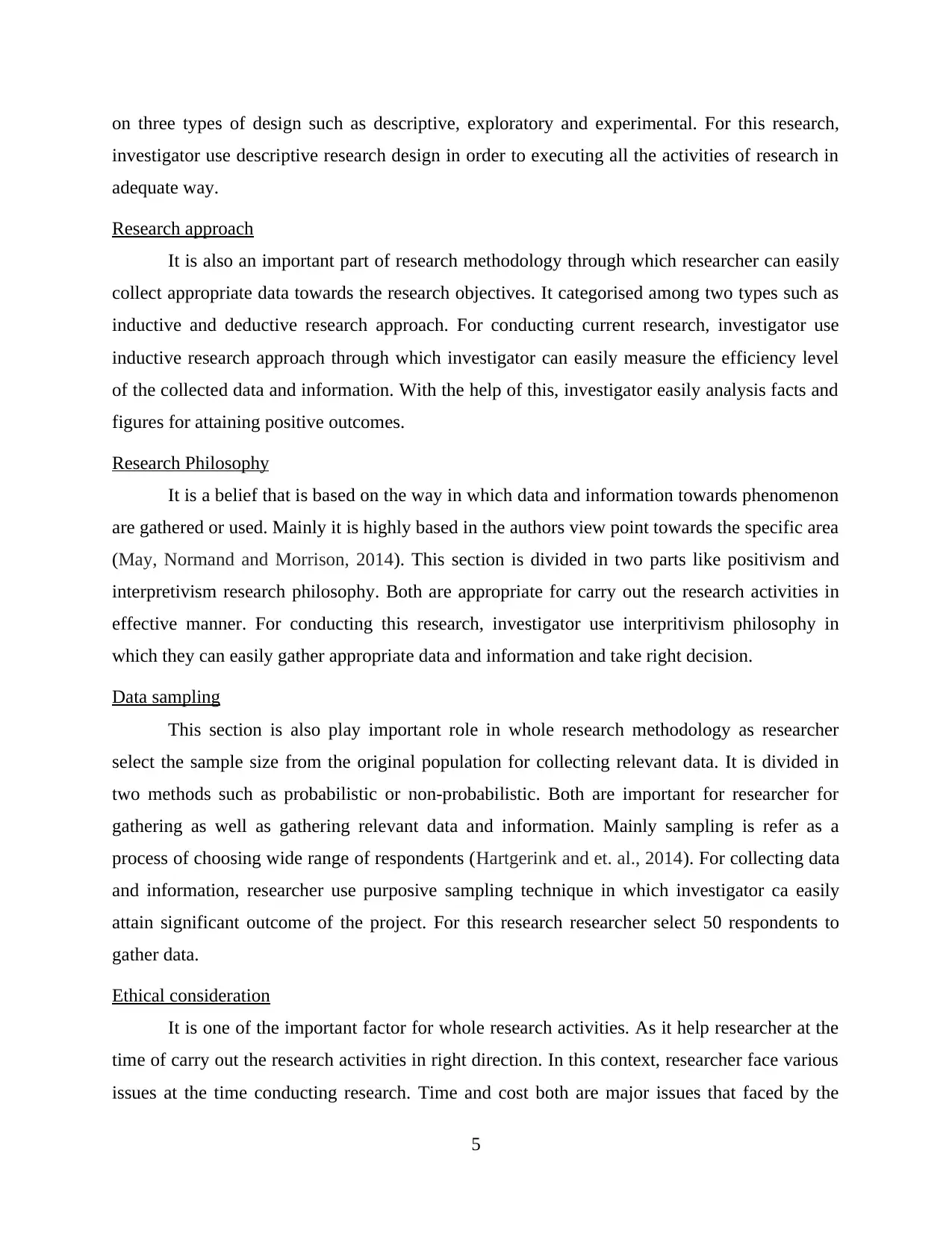
on three types of design such as descriptive, exploratory and experimental. For this research,
investigator use descriptive research design in order to executing all the activities of research in
adequate way.
Research approach
It is also an important part of research methodology through which researcher can easily
collect appropriate data towards the research objectives. It categorised among two types such as
inductive and deductive research approach. For conducting current research, investigator use
inductive research approach through which investigator can easily measure the efficiency level
of the collected data and information. With the help of this, investigator easily analysis facts and
figures for attaining positive outcomes.
Research Philosophy
It is a belief that is based on the way in which data and information towards phenomenon
are gathered or used. Mainly it is highly based in the authors view point towards the specific area
(May, Normand and Morrison, 2014). This section is divided in two parts like positivism and
interpretivism research philosophy. Both are appropriate for carry out the research activities in
effective manner. For conducting this research, investigator use interpritivism philosophy in
which they can easily gather appropriate data and information and take right decision.
Data sampling
This section is also play important role in whole research methodology as researcher
select the sample size from the original population for collecting relevant data. It is divided in
two methods such as probabilistic or non-probabilistic. Both are important for researcher for
gathering as well as gathering relevant data and information. Mainly sampling is refer as a
process of choosing wide range of respondents (Hartgerink and et. al., 2014). For collecting data
and information, researcher use purposive sampling technique in which investigator ca easily
attain significant outcome of the project. For this research researcher select 50 respondents to
gather data.
Ethical consideration
It is one of the important factor for whole research activities. As it help researcher at the
time of carry out the research activities in right direction. In this context, researcher face various
issues at the time conducting research. Time and cost both are major issues that faced by the
5
investigator use descriptive research design in order to executing all the activities of research in
adequate way.
Research approach
It is also an important part of research methodology through which researcher can easily
collect appropriate data towards the research objectives. It categorised among two types such as
inductive and deductive research approach. For conducting current research, investigator use
inductive research approach through which investigator can easily measure the efficiency level
of the collected data and information. With the help of this, investigator easily analysis facts and
figures for attaining positive outcomes.
Research Philosophy
It is a belief that is based on the way in which data and information towards phenomenon
are gathered or used. Mainly it is highly based in the authors view point towards the specific area
(May, Normand and Morrison, 2014). This section is divided in two parts like positivism and
interpretivism research philosophy. Both are appropriate for carry out the research activities in
effective manner. For conducting this research, investigator use interpritivism philosophy in
which they can easily gather appropriate data and information and take right decision.
Data sampling
This section is also play important role in whole research methodology as researcher
select the sample size from the original population for collecting relevant data. It is divided in
two methods such as probabilistic or non-probabilistic. Both are important for researcher for
gathering as well as gathering relevant data and information. Mainly sampling is refer as a
process of choosing wide range of respondents (Hartgerink and et. al., 2014). For collecting data
and information, researcher use purposive sampling technique in which investigator ca easily
attain significant outcome of the project. For this research researcher select 50 respondents to
gather data.
Ethical consideration
It is one of the important factor for whole research activities. As it help researcher at the
time of carry out the research activities in right direction. In this context, researcher face various
issues at the time conducting research. Time and cost both are major issues that faced by the
5
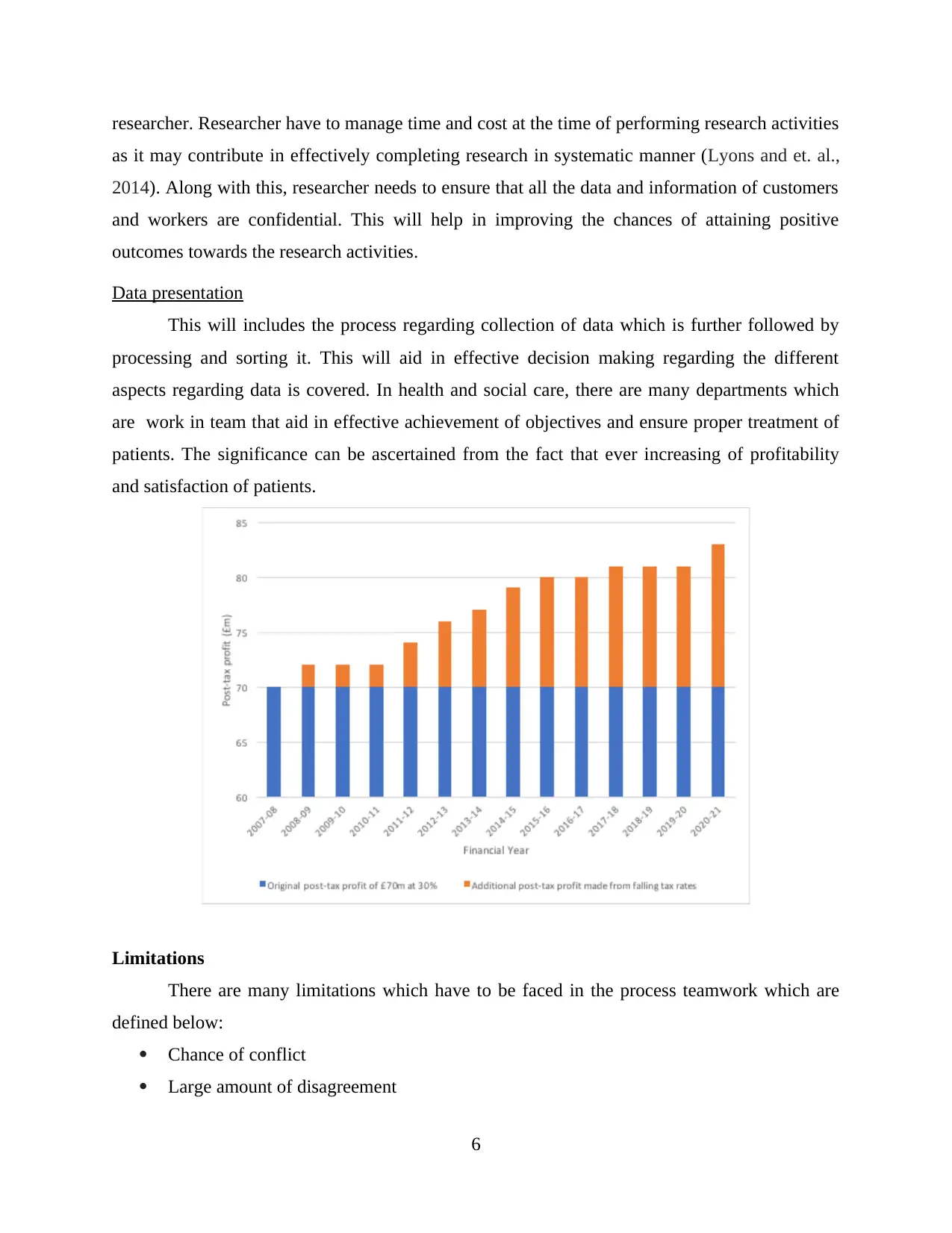
researcher. Researcher have to manage time and cost at the time of performing research activities
as it may contribute in effectively completing research in systematic manner (Lyons and et. al.,
2014). Along with this, researcher needs to ensure that all the data and information of customers
and workers are confidential. This will help in improving the chances of attaining positive
outcomes towards the research activities.
Data presentation
This will includes the process regarding collection of data which is further followed by
processing and sorting it. This will aid in effective decision making regarding the different
aspects regarding data is covered. In health and social care, there are many departments which
are work in team that aid in effective achievement of objectives and ensure proper treatment of
patients. The significance can be ascertained from the fact that ever increasing of profitability
and satisfaction of patients.
Limitations
There are many limitations which have to be faced in the process teamwork which are
defined below:
Chance of conflict
Large amount of disagreement
6
as it may contribute in effectively completing research in systematic manner (Lyons and et. al.,
2014). Along with this, researcher needs to ensure that all the data and information of customers
and workers are confidential. This will help in improving the chances of attaining positive
outcomes towards the research activities.
Data presentation
This will includes the process regarding collection of data which is further followed by
processing and sorting it. This will aid in effective decision making regarding the different
aspects regarding data is covered. In health and social care, there are many departments which
are work in team that aid in effective achievement of objectives and ensure proper treatment of
patients. The significance can be ascertained from the fact that ever increasing of profitability
and satisfaction of patients.
Limitations
There are many limitations which have to be faced in the process teamwork which are
defined below:
Chance of conflict
Large amount of disagreement
6
⊘ This is a preview!⊘
Do you want full access?
Subscribe today to unlock all pages.

Trusted by 1+ million students worldwide
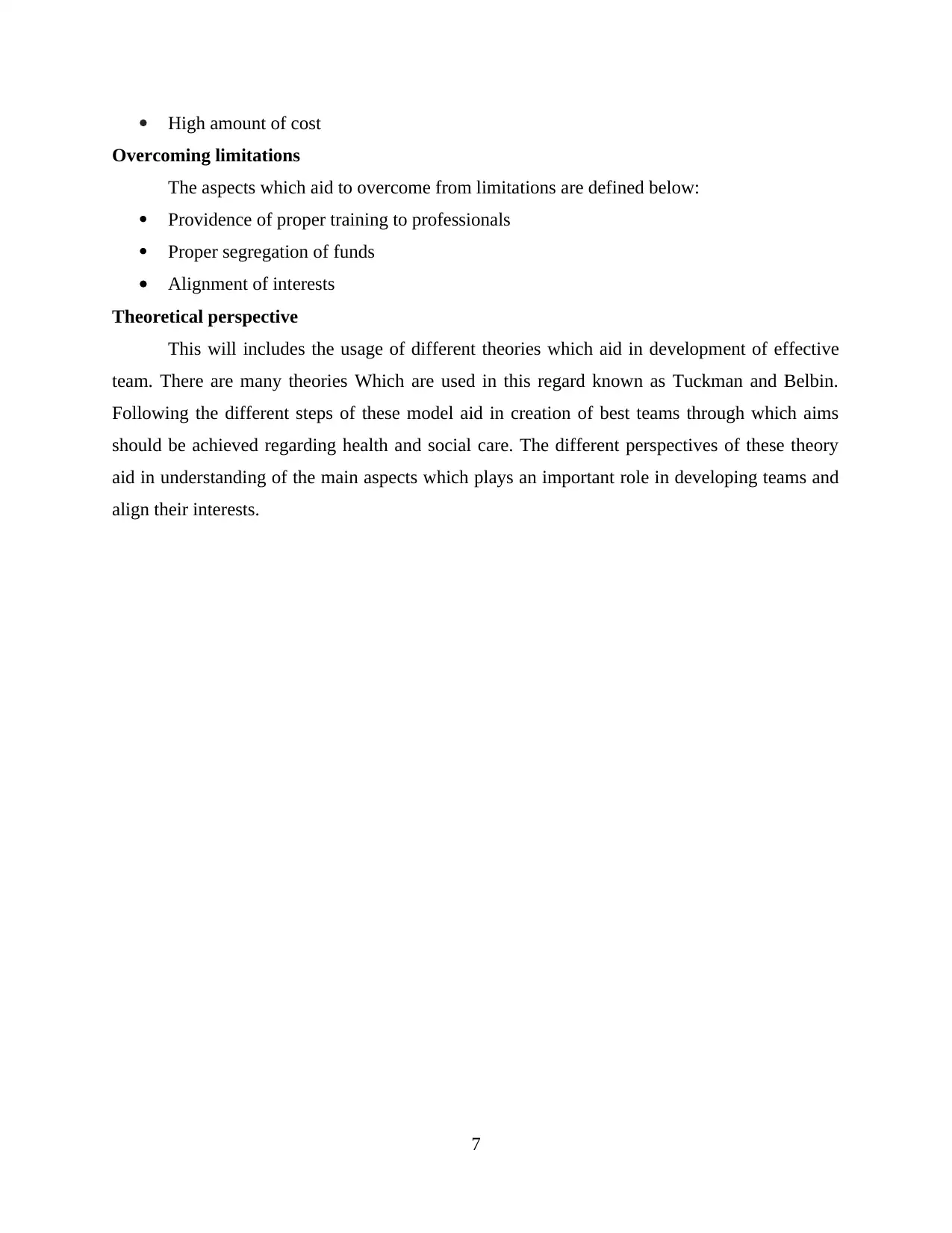
High amount of cost
Overcoming limitations
The aspects which aid to overcome from limitations are defined below:
Providence of proper training to professionals
Proper segregation of funds
Alignment of interests
Theoretical perspective
This will includes the usage of different theories which aid in development of effective
team. There are many theories Which are used in this regard known as Tuckman and Belbin.
Following the different steps of these model aid in creation of best teams through which aims
should be achieved regarding health and social care. The different perspectives of these theory
aid in understanding of the main aspects which plays an important role in developing teams and
align their interests.
7
Overcoming limitations
The aspects which aid to overcome from limitations are defined below:
Providence of proper training to professionals
Proper segregation of funds
Alignment of interests
Theoretical perspective
This will includes the usage of different theories which aid in development of effective
team. There are many theories Which are used in this regard known as Tuckman and Belbin.
Following the different steps of these model aid in creation of best teams through which aims
should be achieved regarding health and social care. The different perspectives of these theory
aid in understanding of the main aspects which plays an important role in developing teams and
align their interests.
7
Paraphrase This Document
Need a fresh take? Get an instant paraphrase of this document with our AI Paraphraser
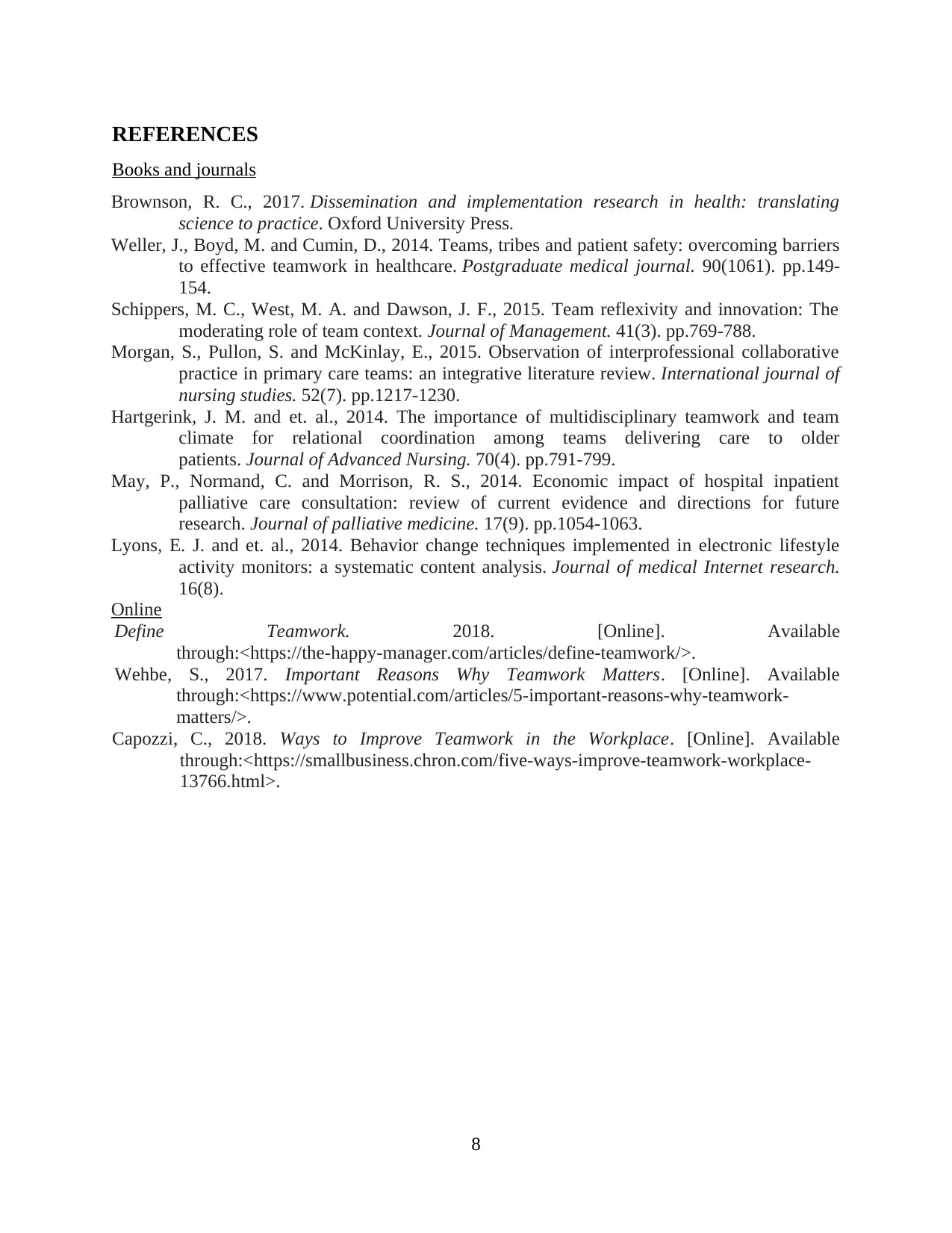
REFERENCES
Books and journals
Brownson, R. C., 2017. Dissemination and implementation research in health: translating
science to practice. Oxford University Press.
Weller, J., Boyd, M. and Cumin, D., 2014. Teams, tribes and patient safety: overcoming barriers
to effective teamwork in healthcare. Postgraduate medical journal. 90(1061). pp.149-
154.
Schippers, M. C., West, M. A. and Dawson, J. F., 2015. Team reflexivity and innovation: The
moderating role of team context. Journal of Management. 41(3). pp.769-788.
Morgan, S., Pullon, S. and McKinlay, E., 2015. Observation of interprofessional collaborative
practice in primary care teams: an integrative literature review. International journal of
nursing studies. 52(7). pp.1217-1230.
Hartgerink, J. M. and et. al., 2014. The importance of multidisciplinary teamwork and team
climate for relational coordination among teams delivering care to older
patients. Journal of Advanced Nursing. 70(4). pp.791-799.
May, P., Normand, C. and Morrison, R. S., 2014. Economic impact of hospital inpatient
palliative care consultation: review of current evidence and directions for future
research. Journal of palliative medicine. 17(9). pp.1054-1063.
Lyons, E. J. and et. al., 2014. Behavior change techniques implemented in electronic lifestyle
activity monitors: a systematic content analysis. Journal of medical Internet research.
16(8).
Online
Define Teamwork. 2018. [Online]. Available
through:<https://the-happy-manager.com/articles/define-teamwork/>.
Wehbe, S., 2017. Important Reasons Why Teamwork Matters. [Online]. Available
through:<https://www.potential.com/articles/5-important-reasons-why-teamwork-
matters/>.
Capozzi, C., 2018. Ways to Improve Teamwork in the Workplace. [Online]. Available
through:<https://smallbusiness.chron.com/five-ways-improve-teamwork-workplace-
13766.html>.
8
Books and journals
Brownson, R. C., 2017. Dissemination and implementation research in health: translating
science to practice. Oxford University Press.
Weller, J., Boyd, M. and Cumin, D., 2014. Teams, tribes and patient safety: overcoming barriers
to effective teamwork in healthcare. Postgraduate medical journal. 90(1061). pp.149-
154.
Schippers, M. C., West, M. A. and Dawson, J. F., 2015. Team reflexivity and innovation: The
moderating role of team context. Journal of Management. 41(3). pp.769-788.
Morgan, S., Pullon, S. and McKinlay, E., 2015. Observation of interprofessional collaborative
practice in primary care teams: an integrative literature review. International journal of
nursing studies. 52(7). pp.1217-1230.
Hartgerink, J. M. and et. al., 2014. The importance of multidisciplinary teamwork and team
climate for relational coordination among teams delivering care to older
patients. Journal of Advanced Nursing. 70(4). pp.791-799.
May, P., Normand, C. and Morrison, R. S., 2014. Economic impact of hospital inpatient
palliative care consultation: review of current evidence and directions for future
research. Journal of palliative medicine. 17(9). pp.1054-1063.
Lyons, E. J. and et. al., 2014. Behavior change techniques implemented in electronic lifestyle
activity monitors: a systematic content analysis. Journal of medical Internet research.
16(8).
Online
Define Teamwork. 2018. [Online]. Available
through:<https://the-happy-manager.com/articles/define-teamwork/>.
Wehbe, S., 2017. Important Reasons Why Teamwork Matters. [Online]. Available
through:<https://www.potential.com/articles/5-important-reasons-why-teamwork-
matters/>.
Capozzi, C., 2018. Ways to Improve Teamwork in the Workplace. [Online]. Available
through:<https://smallbusiness.chron.com/five-ways-improve-teamwork-workplace-
13766.html>.
8
1 out of 11
Related Documents
Your All-in-One AI-Powered Toolkit for Academic Success.
+13062052269
info@desklib.com
Available 24*7 on WhatsApp / Email
![[object Object]](/_next/static/media/star-bottom.7253800d.svg)
Unlock your academic potential
Copyright © 2020–2026 A2Z Services. All Rights Reserved. Developed and managed by ZUCOL.





